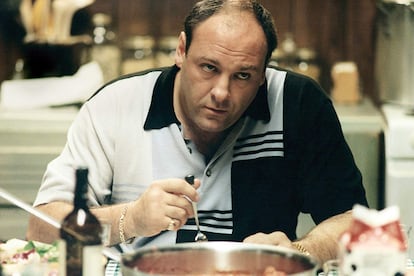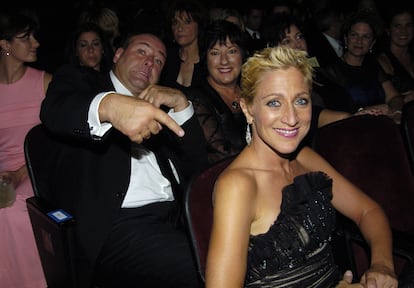How James Gandolfini’s addictions to alcohol and drugs caused chaos during filming of ‘The Sopranos’
In a new book, the locations manager on the emblematic HBO series reveals the difficulty of working with the actor who, despite everything, was a beloved presence on set

Twenty-five years after The Sopranos premiered on HBO, James Gandolfini’s role as Tony Soprano, a mobster who suffers from anxiety attacks, is still considered one of the best performances in television history. The actor, who died from a heart attack in Rome aged 51 on June 19, 2013, left an indelible mark on television fiction, which earned him three Emmy Awards and a Golden Globe for best actor. However, Gandolfini’s struggle against his personal demons meant that the filming of the award-winning series was not straightforward, especially in its later seasons, as revealed in a new book by Mark Kamine, locations manager on the six-season series, in his new book On Locations: Lessons Learned from My Life On Set with The Sopranos and in the Film Industry. In it he explains that, during the filming of the fifth season, Gandolfini’s lifestyle began to cause problems during production.
Kamine relates several anecdotes from the shoot, one of which took place after filming an episode in New Jersey: “I am at the hotel bar when the crew member closest to Jim [Gandolfini] asks if I want to go down to Atlantic City with Jim and a few others.” Atlantic City was an hour’s drive away, and the next day they were to continue filming: “I declined. The next morning I’m not surprised when Jim cannot be roused,” Kamine writes. Eventually, the actor showed up four hours late “cursing his way through his half-learned lines, doing take after take, drinking coffees and bottles of water, alternatively sheepish and churlish, the way he always is when he fucks up.”
As the actor became “less and less trustworthy,” HBO allegedly added “a clause making him responsible for shoot-day costs if he misses work due to excesses of consumption,” the book’s author claims. According to Kamine, who was later executive producer on The White Lotus, there were other factors that made those shoots difficult: Edie Falco, who played Gandolfini’s on-screen wife Carmela Soprano, became frustrated by Gandolfini’s absences, and that he in turn was frustrated by her professionalism: Falco was always “fully prepared, always amazingly and instantly in character. She [was] nothing but an admirable on-set presence throughout the entire run of the show. Jim seems in awe of it and frustrated by her ready access to convincing emotion,” he continued. “He often gets to set not quite in character, cursing himself mid-scene, calling on the script supervisor to feed him lines.” However, Kamine admits, his co-stars and the production team were willing to give him leeway “because Gandolfini more than anyone other than David [Chase] makes the show [what] it is, his expressive features and rich readings and menacing, restrained gesturing delivering great and consistent impact.”

In 2021, investigative journalist James Andrew Miller, known for his reporting in The Washington Post and The New York Times, published Tinderbox: HBO’s Ruthless Pursuit of New Frontiers, a book that relates the story of the network and how it burst onto the scene to kick-start what was later baptized as television’s golden age. In the book, which includes over 750 interviews with actors, producers, managers, and employees of HBO, he recounts the concern among Gandolfini’s management team: “We were concerned about Gandolfini staying alive. Occasionally he would go on a bender or a coke binge. We had to stop production,” Jeff Bewkes, executive director of HBO from 1995 to 2002, told Miller. Bewkes also claimed that the actor sometimes failed to show up on set. He added that he “didn’t pressure” then HBO president Chris Albrecht about Gandolfini because he thought the actor was “embarrassed.”
But Gandolfini’s problems eventually reached the ears of Albrecht, who invited him to his home with the idea of confronting him about going to rehab. Gandolfini, for his part, thought it was just a normal evening: “It became a real problem with shooting the show. It became a lack of respect for the other actors as well,” Albrecht told Miller. When Gandolfini arrived at Albrecht’s house, he encountered a dozen people there, including David Chase and several members of his family. As the manager recounted, Galdofini’s friends and family had rehearsed what to say to him that night, and even had a private jet ready to take him to rehab. But the attempted intervention was cut short when the actor walked in, surveyed the scene, and said, “Oh, fuck this. Fuck all of you,” before leaving.
In his book Kamine makes it clear that, despite everything, Gandolfini was a beloved presence on set. Every Friday night, the actor would take it upon himself to buy sushi for the entire crew, and every season finale he would give each crew member a gift, often worth hundreds of dollars. When the series ended, he gave everyone a watch with an engraved inscription: “The Sopranos. 1997-2007. Rest in peace. Thank you. J.G.”
Sign up for our weekly newsletter to get more English-language news coverage from EL PAÍS USA Edition
Tu suscripción se está usando en otro dispositivo
¿Quieres añadir otro usuario a tu suscripción?
Si continúas leyendo en este dispositivo, no se podrá leer en el otro.
FlechaTu suscripción se está usando en otro dispositivo y solo puedes acceder a EL PAÍS desde un dispositivo a la vez.
Si quieres compartir tu cuenta, cambia tu suscripción a la modalidad Premium, así podrás añadir otro usuario. Cada uno accederá con su propia cuenta de email, lo que os permitirá personalizar vuestra experiencia en EL PAÍS.
¿Tienes una suscripción de empresa? Accede aquí para contratar más cuentas.
En el caso de no saber quién está usando tu cuenta, te recomendamos cambiar tu contraseña aquí.
Si decides continuar compartiendo tu cuenta, este mensaje se mostrará en tu dispositivo y en el de la otra persona que está usando tu cuenta de forma indefinida, afectando a tu experiencia de lectura. Puedes consultar aquí los términos y condiciones de la suscripción digital.









































